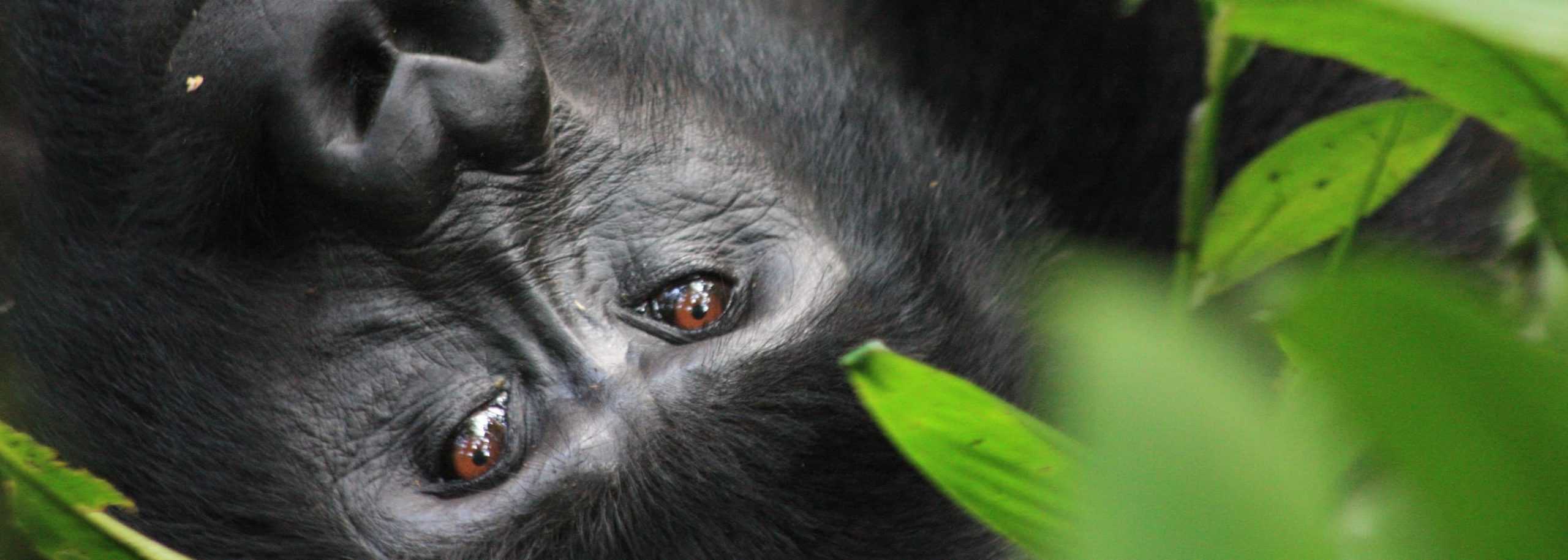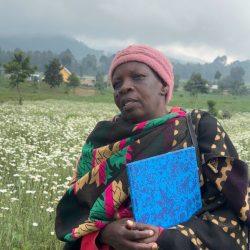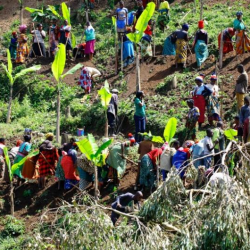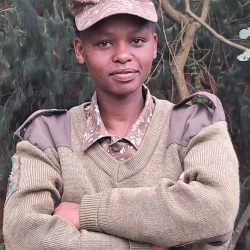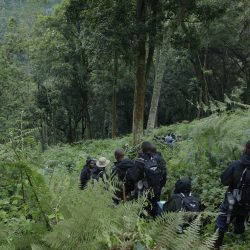From Poacher to Protector: A case of Mandela’s Transformation!
Blog | 4/04/25
“I will hunt down and kill all the wild animals before they finish us off! It is our right to hunt them down for food, and they should not at any point be allowed to defend themselves and get away,” Mandela Edson vowed, 21 years ago. At the age of 12, the now reformed poacher made this strong promise to his father who had been injured by a wild pig during their hunting adventures, and he indeed held onto the promise. Mandela Edson famously known for hunting for so many years hails from Nyarusizi cell, Nteko village, a community adjacent to Bwindi Impenetrable National Park.
A Ruthless Hunter!
Back in 2011, Mandela’s father introduced him to hunting in the mighty Bwindi Forest. A bit hesitant at first probably because he was still so young, Mandela had no choice but to adopt his father’s way of life! Mandela officially started poaching in 2004 at the age of 12 following a gruesome fight between his father and a wild pig! As he narrates the ordeal, you can tell that the memory is still very fresh in his mind 21years later! Mandela’s father had set a snare in the park and Mandela kept entering the park to check if they had caught something! Finally, Mandela had good news for the dad, the snare had caught a huge wild pig! Fast forward, Mandela’s Dad, who had been drinking all day set off to get his prey, but roles flipped! The wild pig viciously attacked, injured and disfigured Mandela’s Dad and that day Mandela made the decision to become a ruthless hunter. “It was a scary site to watch, the pig viciously plugged its long teeth in my father’s belly, fingers and face causing so much bleeding! We carried him out of the park but wouldn’t risk taking him to a health facility for they would quiz us more on the cause of this accident,” Mandela narrates.
Mandela dropped out of school to make his hunting dream a reality. He adopted the slogan “I would rather die than quit poaching” And this made him so ruthless a hunter! The laxity in park protection during those years aided Mandela’s illegal activities in the park but this was short lived! In 2020, the park management invested more efforts in law enforcement and strict monitoring of the park. Park management sensitized poachers against illegal park entry and poaching but all this fell on deaf ears. Mandela instead continued encouraging his fellow hunters and went the extra step to know the patrol teams’ daily schedule!
“Rangers entered the park at 8:00am and got out at 12:00 noon for lunch.We would then enter the forest between 2:30 – 3:00pm slightly before they returned. We later resorted to hunting at night,” narrates Mandela. The poachers devised all tricks to avoid being caught by the law enforcement rangers, ranging from leaving cut boots on the way to make the rangers follow wrong trails, leaping through the small paths especially during the rainy season to prevent thick grass from bending!
While in the forest, Mandela and his friends were determined to leave no stone unturned, they hunted for wild pigs, monkeys, mole rats, ducks, turkeys and duikers.
A Hunter’s Nightmare!
For all his hunting life, Mandela faced overwhelming challenges and often saw death as the best option instead to going to jail. “Each day I left home ready to die and when I married my wife, this worried her so much,” narrates Mandela. According to the 33-year-old, death seemed to be closer and closer each day! Mandela recalls a day one poacher was shot in the park just a few meters away from him! On another occasion, Mandela was saved by a huge tree behind which he hid and watched the rangers pass. “In the event that I got arrested i had vowed to provoke the rangers to shooting me than allowing them to arrest and send me to jail,” says Mandela. On yet another account during his night hunt, Mandela stumbled on a gorilla while it slept, he was determined to kill the animal but luckily for him it run off.
Mandela’s Turning Point
In 2021, IGCP launched the Vanishing Treasures project around Bwindi Impenetrable National Park and Mandela was one of the selected project beneficiaries and trainee. Mandela says the Mindset change training stood out for him. He learned about the importance of conservation and how he can transform his life using alternative livelihood options.
“I realized that our lifestyle was not sustainable. We hunted just for a daily meal but wouldn’t make an earning off selling the bush meat. The meat would soon rot or get finished and we would go back to hunt again and yet there were other peaceful means of making a living,” says Mandela. It is at this training that Mandela decided to denounce poaching and become a gorilla/conservation ambassador.
Using the PIP approach Mandela embarked on farming. He planted over 60 banana trees which he mulched and took good care of.
PIP is an approach that brings household members together to assess their current situation and identify various activities that can help them to develop or achieve household set goals.It wasn’t long before Mandela started to realize benefits from his farming.
Today Mandela owns a tea plantation from which he earns at least UGX 20,000 a day. Additionally, Mandela made a five-year household plan, built a beautiful house – the only outstanding house in his village. He also improved his banana plantation from which he earns at least UGX 130,000 a month. Mandela says he had never made that kind of money in the past. He is at peace and grateful that he finally denounced poaching and embraced conservation.
Mandela was appointed chairman of the park-edge community conservation team. Among others he reports illegal activities in the park and sensitizes poachers in his community against the vice. “Good thing I know all the poachers around because I worked with them before. Also knowing all their tricks helps me to be a step ahead of them,” says Mandela.
Commenting on the Mindset training, Dickson Katana, Warden in Charge of Southern Sector Bwindi Impenetrable National Park says the training was much needed and helpful. It transformed mindsets and solicited support towards conservation. “The training saw to the transformation of the most notorious poachers like Mandela who had become a big threat and challenge to the park. Mandela is now a very collaborative citizen who tips the anti-poaching team about planned poaching activities within the protected area,” Katana remarks.
A message to the Poachers!
“I would advise any poacher or potential poacher that the risk is not worth it! It is more dangerous than satisfying,” Mandela says.
